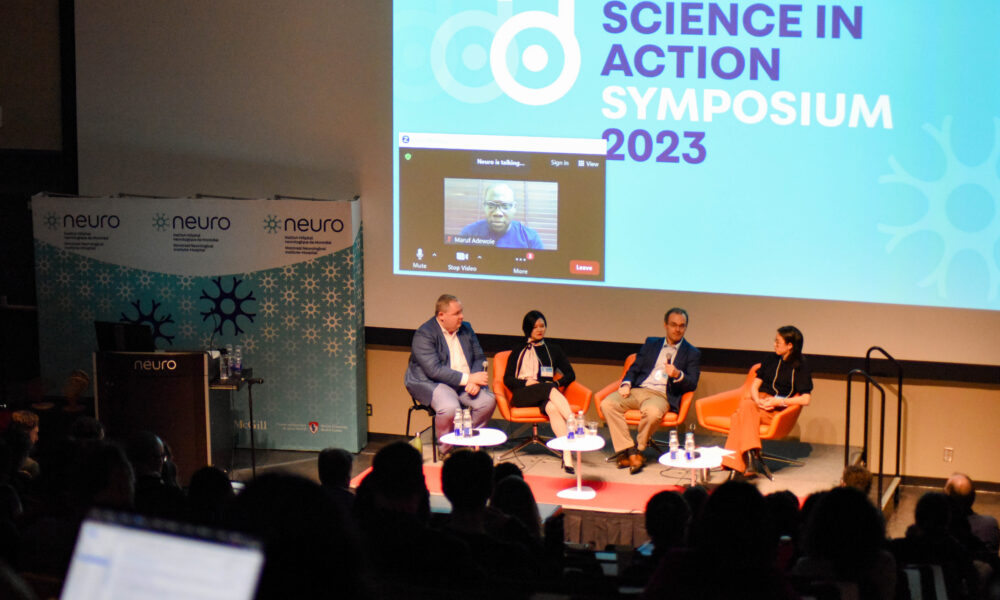On Nov. 30, neuroscience and data-sharing experts came together for a day of insightful talks at The Neuro’s fifth annual Open Science in Action Symposium. Kicking off the event, Annabel Seyller, CEO of the Tanenbaum Open Science Institute (TOSI), emphasized the growing prevalence of open science across scientific institutions in Canada.
“Open science is everywhere,” Seyller said. “I remind you that 2023 is the year of open science.”
She gave an overview of the day’s events before handing the microphone to Christopher Buddle, Associate Provost of Teaching and Academic Planning at McGill, who spoke about open science on the McGill campus—both among students and at institutions like The Neuro. Guy Rouleau, Director of The Neuro and co-founder of TOSI, expanded on these points and discussed the history of open science at McGill.
“When TOSI was created in 2016, the idea was to crystallize open science practice at The Neuro, but also as a living lab for how to, at the institutional level, adopt open science practices,” Rouleau explained.
After these opening remarks, Vincent Larivière, inaugural UNESCO Chair in Open Science and professor of Information Science at Université de Montréal, delivered the keynote address. He spoke on a variety of issues surrounding scholarly publishing, including the difficulties of publishing open-access papers, changes brought about by the COVID-19 pandemic, and the pressures that predatory publishers place on scientists. There was also a panel discussion, moderated by Viviane Poupon, President of Brain Canada, covering the potential of open science to accelerate drug discovery.
The afternoon spotlighted a number of different initiatives—many of which that The Neuro has sponsored—that aim to engage in and promote open science, spanning various areas, such as data sharing, open-source software, and science communication.
Gabriel Pelletier, Open Science Data Manager at TOSI and the moderator of the data-sharing session, highlighted that while these initiatives are of critical importance, implementing them is not always straightforward.
“Data sharing and knowledge sharing is key to accelerate the pace of discovery in neurological diseases and in any domain really, but also has considerable challenges,” Pelletier said in his introduction. “It’s not easy. It takes time, knowledge, and expertise.”
Nikhil Bhagwat, a computational neuroscientist at McGill, addressed these difficulties in his presentation on ParkCore, a tool for sharing data on Parkinson’s disease. “In thinking about open science in Parkinson’s disease, we have to first accept the fact [that] it’s very hard,” Bhagwat said. “We all need more data. But the key word here is we need more open and harmonized data.”
Bhagwat explained that it was not always as simple as just sharing collected data with another scientist: Researchers need to make sure they’re both using the same protocols and software, even the same variable names.
“What we really want is to be able to get the data and be able to use it without having to play this game of twenty questions with whoever is sharing data,” Bhagwat said.
ParkCore helps to ease this process by centralizing and standardizing data on Parkinson’s disease in one easily accessible repository.
Open science practices also include open-source software, referring to software with publicly available source code. This means that anyone can freely download it, and even build their own additions. At the next panel, researchers shared different open-source softwares with a focus on neuroscience, including a Python library called Pynapple, which collects a set of tools for neurological analysis.
The day closed with several projects for science communication, highlighting that open science means sharing knowledge not just with other researchers, but with patients and the public as well. Panelists included Cindy Hovington, host of the Curious Neuron podcast, and Stuart Trenholm, associate professor in McGill’s Department of Neurology, who is involved in an ongoing project to create an interactive neuroscience textbook called The Open Brain.
From patients to students to researchers, all of these projects are committed to sharing data, knowledge, and methods to improve the scientific process for everyone.








